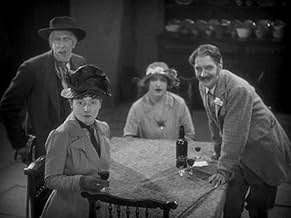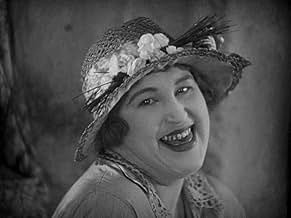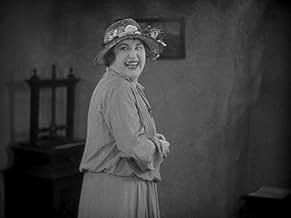CALIFICACIÓN DE IMDb
5.8/10
3.3 k
TU CALIFICACIÓN
Después de que su hija se case, un viudo de mediana edad con una granja decide volver a casarse, pero elegir una pareja adecuada es un proceso problemático.Después de que su hija se case, un viudo de mediana edad con una granja decide volver a casarse, pero elegir una pareja adecuada es un proceso problemático.Después de que su hija se case, un viudo de mediana edad con una granja decide volver a casarse, pero elegir una pareja adecuada es un proceso problemático.
- Dirección
- Guionistas
- Elenco
Lillian Hall-Davis
- Araminta Dench - Sweetland's Housekeeper
- (as Lilian Hall-Davis)
Diana Napier
- Sibley Sweetland
- (as Mollie Ellis)
Harry Terry
- Guest at Wedding Breakfast
- (sin créditos)
- …
Opiniones destacadas
I have both versions, long and short, of "The Farmer's Wife", and they are identical except for the speed at which they were recorded onto tape/DVD. I strongly recommend against the 129-minute version, as it is slower than real-life speed and drags the humor from the film. The shorter version is much funnier and more like Hitchcock, whose films weren't known for their dragginess.
Jameson Thomas, who plays Samuel Sweetland, was at the time of filming a huge star in England. In 1930 he and his wife left England for Hollywood, where he played a few leads in "B" pictures and then settled into a continuous second lead/character groove. He's the doctor at the end of "The Invisible Man" who tells Henry Travers of Claude Rains' demise: "I'm afraid the end will be rather terrible." He also played Mr. Semple, the twitchy false heir, in "Mr. Deeds Goes to Town."
Jameson Thomas, who plays Samuel Sweetland, was at the time of filming a huge star in England. In 1930 he and his wife left England for Hollywood, where he played a few leads in "B" pictures and then settled into a continuous second lead/character groove. He's the doctor at the end of "The Invisible Man" who tells Henry Travers of Claude Rains' demise: "I'm afraid the end will be rather terrible." He also played Mr. Semple, the twitchy false heir, in "Mr. Deeds Goes to Town."
The first half is rather slow, but keep going - it's definitely worth it. The humour in Hitchcock's films is generally based around great character actors (e.g. Jessie Royce Landis in To Catch a Thief and North by NorthWest), and here not one of the actors disappoints. Lillian Hall Davis has a better part in the Ring (also 1928 - Gordon Harker is again very amusing in it too), but is lovely in this film. Sound would have added nothing. My 8-year old daughter was apprehensive about watching a silent film, but once things started to get going in the second half, was hooked.
Hitchcock referred to it in later years as one of his "photographed plays", but the action occurs in several locations, so is nowhere near as constrained as many of his films (plays or not). In fact, even though the location shots are few and far between, they really give this film a non-studio feel.
All of Hitchcock's films are notable for their visual storytelling (look at the initial scene-setting in Rear Window that speaks volumes without a single word being uttered), and it is interesting to see the origins of this, and the great influence of German Expressionism.
Hitchcock referred to it in later years as one of his "photographed plays", but the action occurs in several locations, so is nowhere near as constrained as many of his films (plays or not). In fact, even though the location shots are few and far between, they really give this film a non-studio feel.
All of Hitchcock's films are notable for their visual storytelling (look at the initial scene-setting in Rear Window that speaks volumes without a single word being uttered), and it is interesting to see the origins of this, and the great influence of German Expressionism.
This early Hitchcock silent, his first for British International Pictures, is a simple romantic comedy adapted from a stage play. A far cry from crime and suspense, but at this point Hitchcock had neither the influence nor the realisation of his true forte to select his projects.
As with all but one of the Hitchcock silents, the screenplay was by Eliot Stannard. Stannard, with his typical understanding of the visual medium, dispenses with the wordiness of a direct stage-to-screen adaptation. He allows time for the characters to reveal their feelings in reaction shots and point-of-view shots, and replaces verbal gags with visual ones. The Farmer's Wife is thus as devoid of unnecessary intertitles as, say, The Manxman.
Given its rural setting, Hitchcock was more or less obliged to include some shots of rolling hillsides. Hitch doesn't seem to have liked the countryside much – in most of his later films if it appears at all it's as a functional back-projection – but he doesn't do too badly here as far as pure photographic beauty goes. Other than that the shooting style is typical of Hitchcock. There is a growing use of fluid camera movement, and we can see that Hitchcock technique, whereby the camera appears to be leading the audience, gradually revealing to us or drawing us in.
Whether it comes from Stannard's script or Hitchcock's head I don't know, but there is a massive tendency here towards point-of-view shots during dialogue scenes, in which the other speaker looks straight into camera. The majority of these are rather pointless, with the exception of several appropriately ghastly close-ups of the Farmer's bridal candidates.
To say the conclusion of The Farmer's Wife is predictable would be a grand understatement. A shortsighted person could see it coming through several miles of fog. Not a bad thing in itself, but rather than play upon its obviousness (which Stannard and Hitchcock must have been aware of), the picture simply becomes a tedious game of waiting for the inevitable. The Farmer's Wife is only quite funny, and is altogether too long.
As with all but one of the Hitchcock silents, the screenplay was by Eliot Stannard. Stannard, with his typical understanding of the visual medium, dispenses with the wordiness of a direct stage-to-screen adaptation. He allows time for the characters to reveal their feelings in reaction shots and point-of-view shots, and replaces verbal gags with visual ones. The Farmer's Wife is thus as devoid of unnecessary intertitles as, say, The Manxman.
Given its rural setting, Hitchcock was more or less obliged to include some shots of rolling hillsides. Hitch doesn't seem to have liked the countryside much – in most of his later films if it appears at all it's as a functional back-projection – but he doesn't do too badly here as far as pure photographic beauty goes. Other than that the shooting style is typical of Hitchcock. There is a growing use of fluid camera movement, and we can see that Hitchcock technique, whereby the camera appears to be leading the audience, gradually revealing to us or drawing us in.
Whether it comes from Stannard's script or Hitchcock's head I don't know, but there is a massive tendency here towards point-of-view shots during dialogue scenes, in which the other speaker looks straight into camera. The majority of these are rather pointless, with the exception of several appropriately ghastly close-ups of the Farmer's bridal candidates.
To say the conclusion of The Farmer's Wife is predictable would be a grand understatement. A shortsighted person could see it coming through several miles of fog. Not a bad thing in itself, but rather than play upon its obviousness (which Stannard and Hitchcock must have been aware of), the picture simply becomes a tedious game of waiting for the inevitable. The Farmer's Wife is only quite funny, and is altogether too long.
After his wife dies, and their daughter marries, lonely widowed farmer Jameson Thomas (as Samuel Sweetland) decides to look for holy matrimony with another woman. With the help of devoted housekeeper Lillian Hall-Davis (as Minta Dench) and handyman Gordon Harker (as Churdles Ash), Mr. Thomas proposes to three matronly prospects: independent widow Louie Pounds (as Louisa Windeatt), frigid spinster Maud Gill (as Thirza Tapper), and pillowy postmistress Olga Slade (as Mary Hearn). None of the women prove to be satisfactory, but Thomas' ideal mate is closer than he thinks
If "The Farmer's Wife" were filmed a few years earlier, in Hollywood, with Wallace Reid and Norma Shearer, we might have had four decades of romantic Alfred Hitchcock comedies well, maybe not. Anyway, it's a good silent moving picture. The opening sequence, which shows the sad passing of the farmer's wife, is very effective; it's a good change from the original play, considering the silent film medium. But, this film is too long, with the daughter's marriage immediately and unnecessarily dragging the story down; moreover, the ending is drawn out. Mr. Hitchcock's food filming fetish is evident throughout - nobody touches Ms. Gill's gelatin!
****** The Farmer's Wife (3/2/28) Alfred Hitchcock ~ Jameson Thomas, Lillian Hall-Davis, Gordon Harker, Maud Gill
If "The Farmer's Wife" were filmed a few years earlier, in Hollywood, with Wallace Reid and Norma Shearer, we might have had four decades of romantic Alfred Hitchcock comedies well, maybe not. Anyway, it's a good silent moving picture. The opening sequence, which shows the sad passing of the farmer's wife, is very effective; it's a good change from the original play, considering the silent film medium. But, this film is too long, with the daughter's marriage immediately and unnecessarily dragging the story down; moreover, the ending is drawn out. Mr. Hitchcock's food filming fetish is evident throughout - nobody touches Ms. Gill's gelatin!
****** The Farmer's Wife (3/2/28) Alfred Hitchcock ~ Jameson Thomas, Lillian Hall-Davis, Gordon Harker, Maud Gill
I saw this years ago, enjoyed but forgot about it. On retrospect it seems a very long drawn out 96 minute comedy film with a flimsy plot, even so I wonder what a 129 minute version would be like.
Jameson Thomas plays thicko widower farmer who can't see beyond the end of his nose when it comes to looking to honour a woman by marrying him. It's obvious from the first reel what the story will be and the eventual conclusion, but for all that it's still well worth watching. Some of the outdoor shots are delightful, portraying the English countryside impressionistically, the indoor usually portray people in the throes of pigging themselves within slapstick routines. The farmers' handyman Gordon Harker was even stranger than his master, with make up absolutely caked on his face for some reason.
Altogether, a nice little film, totally inconsequential but with some nice touches from Hitch and fluid camera movements, all helping maintain interest.
Jameson Thomas plays thicko widower farmer who can't see beyond the end of his nose when it comes to looking to honour a woman by marrying him. It's obvious from the first reel what the story will be and the eventual conclusion, but for all that it's still well worth watching. Some of the outdoor shots are delightful, portraying the English countryside impressionistically, the indoor usually portray people in the throes of pigging themselves within slapstick routines. The farmers' handyman Gordon Harker was even stranger than his master, with make up absolutely caked on his face for some reason.
Altogether, a nice little film, totally inconsequential but with some nice touches from Hitch and fluid camera movements, all helping maintain interest.
¿Sabías que…?
- TriviaUnlike most of his later films, this film does not have a cameo by Sir Alfred Hitchcock.
- ErroresAfter Louisa rejects Farmer Sweetland, his horse changes position it between shots as he mounts it.
- Citas
Farmer Sweetland: ...I am a man that a little child can lead but a regiment of soldiers couldn't drive.
- ConexionesFeatured in The Skin Game (1931)
Selecciones populares
Inicia sesión para calificar y agrega a la lista de videos para obtener recomendaciones personalizadas
Detalles
Taquilla
- Total a nivel mundial
- USD 152
- Tiempo de ejecución1 hora 40 minutos
- Color
- Mezcla de sonido
- Relación de aspecto
- 1.33 : 1
Contribuir a esta página
Sugiere una edición o agrega el contenido que falta

Principales brechas de datos
By what name was The Farmer's Wife (1928) officially released in India in English?
Responda






























